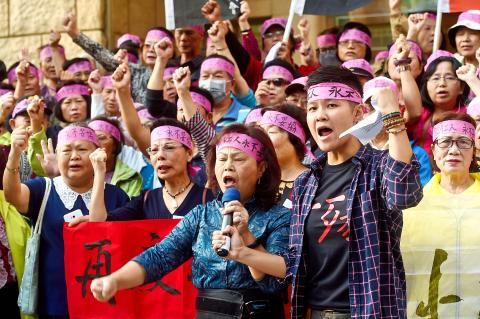The Taiwan High Court yesterday upheld a verdict ordering Radio Corp of America (RCA) and its affiliates to pay NT$718.4 million (US$23.7 million) to its former Taiwanese employees and their families.
Yesterday’s ruling increased the compensation from NT$564.45 million in the first ruling in 2015, with stakeholders closely watching the court’s decision in one of the nation’s longest-running legal battles between a major corporation and workers.
RCA, which operated several production plants in Taiwan from 1970 to 1992, was in 1986 taken over by General Electric Co (GE), which later sold it to Thomson Consumer Electronics, the US subsidiary of France-based Thomson Multimedia, which is now called Technicolor SA.

Photo: Chien Jung-fong, Taipei Times
The court included GE, Technicolor and Thomson as defendants, ordering them, along with RCA, to pay compensation to 486 former employees.
In the first ruling, the judges wrote that they were unable to determine whether RCA was a subsidiary of GE, based on RCA’s business registration, and omitted GE as a responsible party.
However, an investigation found that GE took over RCA before selling it to Thomson, which took ownership of an RCA production plant in then-Taoyuan County.
The judges ruled that GE was in control of RCA’s operations in Taiwan during the period in which the workers said chemicals from the plants caused them to develop cancer and other illnesses.
While the plaintiffs were comprised of 486 former employees, yesterday’s ruling said three workers began work at RCA’s Taoyuan plant after 1988, adding that GE would not be required to compensate the three, but would be required to contribute to NT$717.7 million in compensation for the remaining 483 workers.
Members of the RCA Self-Help Association, which represented the workers, yesterday afternoon gathered in front of the High Court’s Taipei branch to hear the decision, smiling and clapping when it was read to them.
They had sought damages of NT$2.7 billion from RCA, GE and Thomson.
RCA operated plants in then-Taoyuan County, as well as Hsinchu and Yilan counties, which employed tens of thousands of people to produce color TVs and other consumer electronics using 31 kinds of organic solvents, including trichloroethylene and tetrachloroethene, exposure to which increases the risk of cancer, the verdict said.
In 1998, the Environmental Protection Administration found that the site of the former RCA plant in then-Taoyuan County was contaminated with chlorinated organic solvents and other toxic chemicals, due to the company illegally digging wells to bury waste, which contaminated tap water used by the workers and nearby residents.
Between 1992, when RCA shut down its plants in Taiwan, and 2004, when 519 members of the association filed the civil lawsuit, more than 1,300 of the firm’s Taiwanese employees have been diagnosed with various types of cancer, with 221 of them dying, the 2015 ruling said.

FREEDOM OF NAVIGATION: The UK would continue to reinforce ties with Taiwan ‘in a wide range of areas’ as a part of a ‘strong unofficial relationship,’ a paper said The UK plans to conduct more freedom of navigation operations in the Taiwan Strait and the South China Sea, British Secretary of State for Foreign, Commonwealth and Development Affairs David Lammy told the British House of Commons on Tuesday. British Member of Parliament Desmond Swayne said that the Royal Navy’s HMS Spey had passed through the Taiwan Strait “in pursuit of vital international freedom of navigation in the South China Sea.” Swayne asked Lammy whether he agreed that it was “proper and lawful” to do so, and if the UK would continue to carry out similar operations. Lammy replied “yes” to both questions. The

‘OF COURSE A COUNTRY’: The president outlined that Taiwan has all the necessary features of a nation, including citizens, land, government and sovereignty President William Lai (賴清德) discussed the meaning of “nation” during a speech in New Taipei City last night, emphasizing that Taiwan is a country as he condemned China’s misinterpretation of UN Resolution 2758. The speech was the first in a series of 10 that Lai is scheduled to give across Taiwan. It is the responsibility of Taiwanese citizens to stand united to defend their national sovereignty, democracy, liberty, way of life and the future of the next generation, Lai said. This is the most important legacy the people of this era could pass on to future generations, he said. Lai went on to discuss

SECOND SPEECH: All political parties should work together to defend democracy, protect Taiwan and resist the CCP, despite their differences, the president said President William Lai (賴清德) yesterday discussed how pro-Taiwan and pro-Republic of China (ROC) groups can agree to maintain solidarity on the issue of protecting Taiwan and resisting the Chinese Communist Party (CCP). The talk, delivered last night at Taoyuan’s Hakka Youth Association, was the second in a series of 10 that Lai is scheduled to give across Taiwan. Citing Taiwanese democracy pioneer Chiang Wei-shui’s (蔣渭水) slogan that solidarity brings strength, Lai said it was a call for political parties to find consensus amid disagreements on behalf of bettering the nation. All political parties should work together to defend democracy, protect Taiwan and resist

By refusing to agree spending increases to appease US President Donald Trump, Spanish Prime Minister Pedro Sanchez threatened to derail a summit that NATO Secretary-General Mark Rutte needs to run smoothly for the sake of the military alliance’s future survival. Ahead of yesterday’s gathering in The Hague, Netherlands, things were going off the rails. European officials have expressed irritation at the spoiler role that Sanchez is playing when their No. 1 task is to line up behind a pledge to raise defense spending to 5 percent of GDP. Rutte needed to keep Spain in line while preventing others such as Slovakia